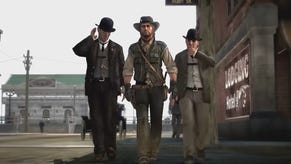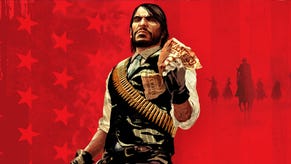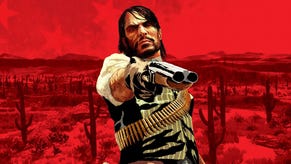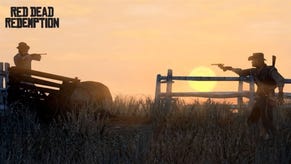Red Dead Redemption
Forgiven.
Missions are, as in GTA, assigned by key characters you meet in towns and outposts. These boast the same simple inventiveness that has always marked Rockstar's work out - and for those wearied by years of delivering drugs and stealing cars, the chance to herd cattle in a thunderstorm, act as an accomplice in a snake oil salesman's scam, or shoot rabbits as they try to steal a friend's carrots at night makes for a welcome, often creative change. Of course, as the game progresses, so the brutality scales with it. High-speed horseback shoot-outs in which you can either choose to take out the rider or the animal have never felt so dynamic, and even the simplest of objectives is made interesting by the emergent chaos that ensues.
Key story missions are buffered by a seemingly endless clutch of side-quests and playful distractions. Some of these, such as the games of poker, five-finger fillet, and horseshoe throwing, or the bounties you can take on, exist simply to swell your bank balance. But very often, you'll be hailed by strangers in need at the side of the road. Stop to inquire as to their predicament and they'll send you on an errand (or spring a trap), one that can often be approached in different ways, and which affects your standing in the community. These might be to convince an old man to part with his property, or may require a more immediate response (such as the hooker set upon by an angry client - "I'm gonna cut you a new hole") but either way, they help to pepper the world with distraction and break up the linearity.
With meta-challenges for hunting and skinning particular animals, collecting herbs and plants and finding treasure, each traipse across the landscape is littered with interactive potential. Where GTA's cities are densely packed with life and story, the wilderness could easily have been too empty in its expanse. By punctuating every journey with side-quest offshoots, Rockstar ensures the game world is just as packed as Liberty City, while still maintaining that visual sense of isolation and loneliness that is so crucial to the Western.
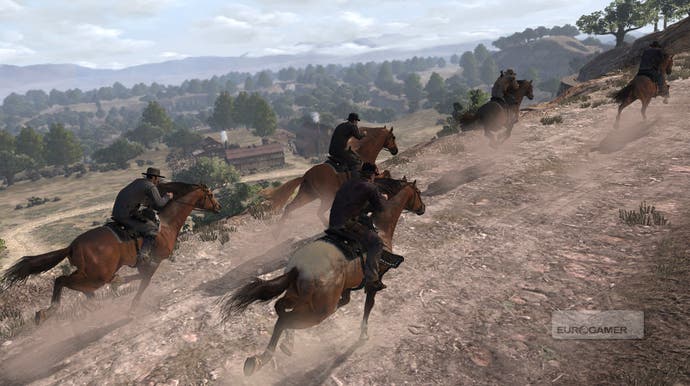
Your primary mode of transport across the world is by horseback, the animal fast proving itself to be a far more flexible and dynamic mode of transport than a hi-jacked car, able to comfortably negotiate any type of terrain. When you gain access to a lasso it's possible to harness any wild horses you come across by chasing alongside them and hurling your rope over their neck. What should, by rights, be a fiddly task is made straightforward, as simple as lining up a moving headshot with your reticule, and then easing the animal to a standstill. Once reigned you can mount the horse and, following a short mini-game of sorts in which you attempt to ride out the horse's bucking by altering your balance, the animal is yours to ride.
Despite the temptation to chop and change between horses (different breeds offer different levels of obedience, speed or stamina), there are benefits in sticking to a favourite, as in time you build loyalty which results in stamina bonuses, allowing you to run at full pelt for longer before tiring the horse. As you begin to clock up the miles together across, hill, canyon and stream, you form a bond - and this relationship between protagonist and transport, the kind alluded to in the great Westerns, is undoubtedly one of Red Dead Redemption's greatest successes.
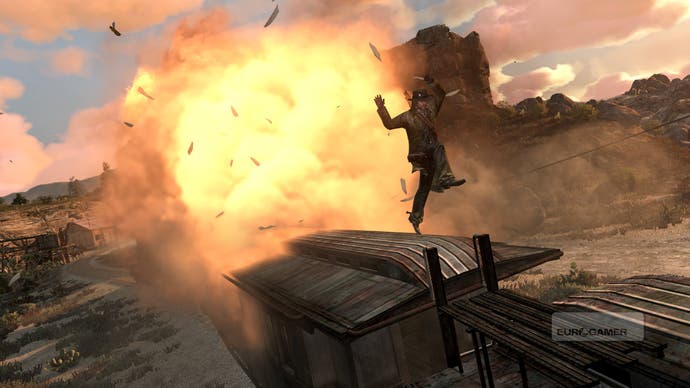
Forget to tether your horse when stopping in a town and you need only whistle and the stallion will come running, the kind of convenience that even the most technologically-advanced vehicle in Grand Theft Auto must stop short of. Hog-tie a bandit and you can roll him onto the horse's hindquarters and carry him across the world. By the end of the game there will be no doubt in your mind: without the need to feed, water or rest your virtual animal, horses are better than cars.



